Presidential Doctoral Fellowship for Research Training in Health Disparities
Striving to Address a National Public Health Challenge
Striving to Address a National Public Health Challenge
Health disparities are a national public health challenge — with career opportunities growing to meet that need, especially at government agencies, NGOs, research institutions and universities.
The Presidential Doctoral Fellowship for Research Training in Health Disparities at the University at Albany trains New York’s next generation of minority health disparities researchers.
The Fellowship program covers Fellows’ full tuition and mandatory fees for four years while they pursue a doctoral degree and receive transdisciplinary training in health disparities. Review Fellowship requirements and guidance for mentors.
Meet our current Fellows and Fellowship alumni.
The Center for the Elimination of Minority Health Disparities (CEMHD) offers several benefits to students enrolled in the Fellowship program, including:
To be eligible for the Fellowship, applicants must:
A master’s degree is preferred but not required.
A student seeking admission to the Fellowship program must first initiate an application for admission to a doctoral program at the University.
Apply for admission through the Graduate School.
Note: Graduate programs have their own application requirements and deadlines. You may need to apply earlier than the doctoral program’s deadline to be considered for the Fellowship.
Fellowship applicants must also provide a one-page essay describing their interest in health disparities issues and research. This is due by February 1 of the calendar year in which an applicant plans to begin doctoral studies at UAlbany.
Essays should be submitted via email to both CEMHD@albany.edu and the director of the applicant’s intended doctoral program. Please use “Health Disparities Fellowship Application Essay” as an email subject line.
Once you're admitted to a doctoral program, the program must nominate you for the Fellowship. That nomination and your Fellowship essay will be reviewed by CEMHD's Fellowship Committee, which makes recommendations to the Fellowship program director.
You and your doctoral program will be notified of the program’s final decision.
If you are invited to participate in the Fellowship program, you must accept or decline by the deadline provided. Note: This date may be before your intended doctoral program’s application deadline.

“Of all the forms of inequality, injustice in health is the most shocking and the most inhuman.” – Dr. Martin Luther King, Jr.
To successfully complete the Fellowship, you must complete all the following requirements.
You must earn a degree from any of UAlbany’s doctoral programs. Your assigned graduate advisor will also serve as your primary Fellowship mentor.
You must also earn a Certificate of Graduate Study in Health Disparities from UAlbany. Visit the Graduate Bulletin for the certificate program’s requirements. Note: Any course substitution must be approved by the director of the certificate program.
You must remain a registered, full-time graduate student to receive funding for your tuition, mandatory fees and stipend. Fellows may not accept any other form of paid employment, on or off campus, during the academic year.
To be considered full-time, you must register for 9 credits. Fellows who wish to register for 12 credits must request approval from CEMHD in writing before registration.
Once you’ve completed all required coursework and successfully passed your qualifying exams, you can then register for a 1-credit dissertation course and still be considered full-time.
You must complete four experiential learning placements, which are a key component of the Fellowship’s transdisciplinary training. You will work with a mentor at each placement.
Placements, or rotations, should broaden your experience by helping you learn about fields that intersect with your doctoral specialization but are not within it, so you can better understand how other fields could support your intended research and how your research could support them.
Placements can be:
If you need assistance in identifying a potential placement, please contact the program director.
You may not repeat placements, except with the permission of the program director, and placements cannot be with your graduate advisor, who serves as your primary mentor in the Fellowship program.
Typically, some of the placements happen after your first year of graduate study and before you begin writing a dissertation. Once you complete four rotations, you will concentrate on your own research, under their primary mentor’s supervision.
The time commitments for each rotation should be equal to that of one course (about six to nine hours per week for one semester), or about 20 to 25% of the Fellow’s course load.
You may obtain credit for a placement by registering for an independent study in your academic department, with your primary mentor’s approval, if desired. Otherwise, placements are considered volunteerism.
You will work with a mentor at each placement. This rotational mentor (not your primary mentor) should supervise your placement.
You must obtain approval from both your primary mentor and the CEMHD Director for each placement at least two weeks before the start of the placement. We recommend requesting approval the semester before the placement would occur.
To request approval, you must submit an Experiential Learning Placement Approval Form and include the name of the organization or scholar, their goal for the placement and the number of hours expected.
At the end of each placement, you must submit a Experiential Learning Placement Final Report Form to both your primary mentor and the CEMHD director.
Fellows are required to attend:
Meeting information is shared via email.
Currently, Task Force meetings are held via Zoom but this is subject to change at any time. You will be notified if such a change occurs in time for you to make the necessary arrangements.
Attendance is taken at all meetings.
Fellows’ tuition and mandatory fees are covered for four years during their doctoral studies. If you do not complete all degree requirements in four years, you may request consideration of a fifth year of funding. However, a fifth year of funding cannot be guaranteed. Please refer to the guidelines below for further details.
Approval for a fifth year of funding is based on academic performance, mentor evaluations and funding availability. Fellows should also explore possibilities of additional funding through their academic departments.
The Fellowship does not cover optional fees, and Fellows are responsible for any applicable optional fees that appear on their student account.
Graduate students may opt-out of some fees. Please visit the Office of Student Accounts’ Fees Descriptions & Policies webpage for more information.
Applying for a Fifth Year of Fellowship Support
CEMHD recognizes that in some circumstances, students may be unable to complete their doctoral program in four years. When that is the case, students may apply for a fifth year of funding, though approval is not guaranteed.
Fifth year support is subject to the availability of funds and the CEMHD Director’s approval. Fellows funded through the Hearst Foundations’ award to CEMHD must also seek approval from the Hearst Foundations.
To apply for a fifth year of funding, a Fellow must notify the CEMHD Director by January 15 of the Fellow’s fourth year. Then, the following documentation must be submitted to the CEMHD Director by March 15 of the Fellow’s fourth year:
Note: In no circumstances can the Fellowship program continue to provide financial support beyond a fifth year.
Please contact the CEMHD Director with any questions about applying for a fifth year.
You are allocated $500 per academic year to cover professional association membership dues.
You must confirm with CEMHD that an organization’s dues are eligible for reimbursement before incurring charges.
To be reimbursed, you must submit an electronic receipt with the organization’s name, amount paid and purpose of payment (membership). Note: Reimbursement may take a few weeks to be processed.
Any unused portion of the annual allocation cannot be rolled over to the next academic year.
You are allocated $1,500 per academic year to cover travel (airfare, accommodations and meals) to annual professional meetings or conferences within your discipline with certain stipulations. Chief among these requirements is that the poster/presentation must be relevant to health disparities.
You must submit your abstract to the CEMHD Director for approval and to confirm that your travel is eligible for reimbursement. Do not make any reservations without this confirmation. We suggest you submit your abstract for approval months before the conference date.
When planning travel, you must follow all rules for either travel funded by the Division for Research & Economic Development (for Research Foundation funded Fellows) and/or travel funded by the Office of State Accounting (for Hearst Foundation funded Fellows) — including using designated travel agencies and rental car companies.
Be sure to review the appropriate website, as linked above, for detailed guidance before making any arrangements. Note: If you make flight arrangements personally or through another travel agency, they will not be approved for reimbursement.
Before making any travel plans, please contact CEMHD@albany.edu to discuss the latest reimbursement rules, as they change frequently.
To be reimbursed, you must supply the following documentation:
Failure to follow these rules and/or supply appropriate documentation will result in denied reimbursement requests. Expenses over the $1,500 annual allocation will not be reimbursed.
Any unused portion of the annual allocation cannot be rolled over to the next academic year.
Contact CEMHD@albany.edu with any questions.

Fellows have two types of mentors:
Both types of mentors are eligible to receive financial benefits for their work supporting our Fellows.
Primary mentors are required to work with their Fellow to discuss, complete and approve the forms required for their appointment with the Research Foundation (RF). Please be aware of the following:
Fellows’ ongoing work as a Research Assistant is to aid in their degree progression, as Fellows are hired by the RF and not by their academic department. Fellows are not expected to work for their mentor in any capacity.
CEMHD will send appointment forms once a Fellow is accepted into the program.
New fellows complete the appointment process through Research Foundation Human Resources (RFHR). Please contact Shari Lombardoni from RFHR at slombardoni@albany.edu with any questions about appointment forms.
Supervision
Primary mentors are expected to supervise a Fellow pursuing doctoral work in the mentor’s department and ensure that the Fellow is meeting the Fellowship’s academic and experiential learning requirements as well as the requirements of their doctoral program.
End of Semester Evaluations
Primary mentors must also complete an End of Semester Fellow Evaluation on Fellows’ progress. Mentors will receive a request for this information after the end of each academic year.
A significant part of the evaluation is determining your Fellow’s progress toward completing the Health Disparities certificate program.
If you fail to submit a completed evaluation on time, it may affect your Fellows’ program support in subsequent years.
Work Plan
The nature of the funding for the Fellowship program requires that, to receive their stipend, the Fellows be appointed as either Research Assistants through the Research Foundation (RF), if their appointment is supported by NIH funding, or Graduate Assistants through the University, if their appointment is supported by Hearst Foundation funding.
As part of the appointment process, CEMHD will create a work plan for each Fellow appointed as Research Assistants and send it to the mentor/Fellow for approval and signatures. (Fellows appointed as Graduate Assistants are not required to file a work plan.)
The work plan cannot include any coursework or lab work completed for academic credit. Since Fellows are required to attend at least seven Minority Health Task Force meetings and to meet monthly with the Fellowship director during the academic year, these activities will be part of the work plan.
Timesheets
Primary mentors must also sign off on the work performed for Fellows to be paid. You will receive an email to review and approve your Fellow’s timesheet electronically.
This is a requirement for all RF and UAlbany employees.
Primary mentors are expected to help their Fellows select four experiential learning placements (ELPS), or rotations and coordinate these placements with the Fellows’ completion of their home department’s doctoral program requirements.
You are responsible for helping your Fellow find beneficial rotations, with the program director's help. Please contact the CEMHD Director for more information and/or assistance.
At each placement, Fellows work with a rotational mentor, who supervises their work there.
Primary and rotational mentors are allocated funding each academic year to cover their own travel (airfare, accommodations and meals) so they may accompany their Fellow to professional meetings or conferences to present on health disparities research.
The presentation(s) must be clearly related to health disparities and within the Fellow’s focus of study. This must be clear from the abstract(s), which must be approved beforehand by the CEMHD Director.
You must submit your abstract to the CEMHD Director for approval and to confirm that your travel is eligible for reimbursement. Do not make any reservations without this confirmation. We suggest you submit your abstract for approval months before the conference date.
Primary mentors are allocated $1,500 annually for travel. Rotational mentors are allocated $500 annually for travel. Fellows also receive travel funding for these purposes.
Note: If the Fellowship program experiences a shortfall in anticipated revenue, funds typically set aside for mentors may not be available. In these circumstances, all available funds will be used to support current Fellows.
Any unused portion of the annual allocation cannot be rolled over to the next academic year. Likewise, you cannot be reimbursed for travel that took place during a different academic year.
When planning travel, you must follow all rules for either travel funded by the Division for Research & Economic Development (for mentors with Research Foundation funded Fellows) and/or travel funded by the Office of State Accounting (for mentors with Hearst Foundation funded Fellows) — including using designated travel agencies and rental car companies.
Be sure to review the appropriate website, as linked above, for detailed guidance before making any arrangements. Note: If you make flight arrangements personally or through another travel agency, they will not be approved for reimbursement.
Before making any travel plans, please contact CEMHD@albany.edu to discuss the latest reimbursement rules, as they change frequently.
To be reimbursed, you must supply the following documentation:
Failure to follow these rules and/or supply appropriate documentation will result in denied reimbursement requests. Expenses over the annual allocation will not be reimbursed.
Contact CEMHD@albany.edu with any questions.
Primary mentors are also allocated $500 annually to support professional associations and/or societies’ dues.
You must confirm with CEMHD that an organization’s dues are eligible for reimbursement before incurring charges.
To be reimbursed, you must submit an electronic receipt with the organization’s name, amount paid and purpose of payment (membership). Reimbursement may take a few weeks to be processed.
Please contact the CEHMD Director for reimbursement instructions.
Note: If the Fellowship program experiences a shortfall in anticipated revenue, funds typically set aside for mentors may not be available. In these circumstances, all available funds will be used to support current Fellows.


Jacob entered the Fellowship program in Fall 2023, as a doctoral student in the Department of Sociology.
Over the last year, Jacob has been deeply engaged in researching health disparities in predominantly minority neighborhoods, with a specific focus on the Bronx, NY.
He is committed to understanding and addressing the complex social and economic factors that contribute to unequal health outcomes in these communities.
Together with Dr. Ruchs-Ahidiana, Jacob is currently assisting with a publication that aims to measure and analyze racialized labor markets.
Their goal is to investigate the existence of occupational segregation and understand the dynamics of job selection across different racial and ethnic groups.
This research is particularly important in highlighting how systemic inequalities in employment contribute to broader health disparities.
In addition to his academic research, he has expanded his focus this year to include community-oriented projects.
He aims to bridge the gap between academic research and real-world application, ensuring that his work contributes to tangible improvements in the lives of people in these communities.
He is excited to continue exploring new and constructive ways to make a positive impact on the lives of those affected by health disparities.
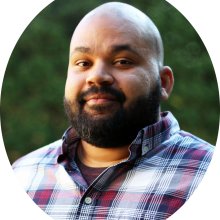
Justin entered the Fellowship in 2020 and is a doctoral student in the School of Criminal Justice.
Justin’s current research agenda is rooted in addressing racial disparities and inequities in two domains: the criminal legal system and health outcomes.
Using mixed methods, his work follows three paths:
Additionally, Justin teaches summer courses on inequality in the criminal legal system and qualitative methods for the Bard Prison Initiative.
With these various threads of inquiry and his diverse skill set, Justin is excited to continue his work in either an academic or private industry setting after graduation.
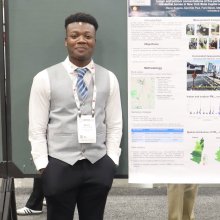
Darvensky ‘Marco’ Eugene was born and raised in Haiti. He is entering the Fellowship program in Fall 2024 as a doctoral student in the Department of Environmental Health Sciences.
Originally, he attended college with the goal of going to medical school. However, after his first year, he received an internship through the Collegiate Science and Technology Entry Program (CSTEP) and the Louis Stokes Alliances for Minority Participation (LSAMP) program in their summer research program at the University at Albany. Through this experience he was introduced to principles of research.
He started working with Dr. Aynul Bari, in the department of Environmental and Sustainable Engineering, on an air pollution project. Their work focused on monitoring diverse fine particulate matter in households across the Capital and Hudson Valley Region of New York State.
Results from this study will benefit the general population by improving their knowledge, increasing their awareness, and informing policy makers of the need to reduce indoor and near-field outdoor air pollution sources. This task is especially important for people living in underserved neighborhoods. Due their socio-economic circumstances, they experience higher levels of pollution than the general U.S. population.
These communities have often had some of the highest rates of chronic and inspiratory illnesses due to numerous environmental stressors, including air pollution.
This experience eventually made Marco realize that he wanted to study the health impacts pollution can have in underrepresented neighborhoods.
Marco’s current research, along with Dr. David Carpenter, aims to identify the potential oxidative effects of polychlorinated biphenyls (PCBs), which are classified as carcinogens, in the human body.
He will continue to study not only PCB’s oxidative effects, but other air toxicants such as volatile organic compounds (VOCs) and polyfluoroalkyl substances (PFAS), which are more prevalent in underserved neighborhoods.

Chrismery entered the Fellowship program in 2023 and is a student in the College of Integrated Health Sciences’s DrPH program.
She has held positions conducting domestic violence and sexual assault prevention, youth substance use prevention, gambling prevention and addressing health disparities among vulnerable and marginalized populations.
In addition to her studies at UAlbany, she co-chairs the Massachusetts Public Health Association’s Racial Equity and Health committee and belongs to a historically Black sorority, Sigma Gamma Rho.
Her research interests include minority health disparities, marginalized communities, and translational research. Her goals are to decrease gaps in life expectancy rates through community engagement and advocacy efforts.
Currently, Chrismery is collaborating on a project spearheaded by the Albany Medical Center piloting interventions that reduce abuse of opioids through the emergency department.
Ms. Gonzalez’s goal is to be at decision-making tables and ensure all policies, practices, and resources are carried out in equitable manners that address the neglected communities of color experience.

Jazmin entered the Fellowship program in 2020 and is a PhD candidate in the Department of Anthropology. Her sub-specialty is cultural medical anthropology.
Jazmin’s main research interests are reproductive health and healthcare disparities, as well as the circulation of health-related conspiracy beliefs.
Currently, she is conducting research for her dissertation, which looks at contraceptive access, attitudes and decision making among rural southern African American women in North Carolina.
Aside from her dissertation research, she recently worked on an interdisciplinary research study looking at vaccine behaviors and attitudes among reproductive age African American women in New York.
She is currently working on the manuscripts from this project with her faculty collaborators. With her work, her overall goal is to help achieve health and healthcare justice.

Rosie entered the Fellowship program in 2020 and is a PhD student in the School of Social Welfare. She is interested in how health policy enables and mitigates inequalities.
Her academic goals are to explore strategies to bring together health equity, and micro-level and macro-level social work practices and principles within the health policy-setting environment.
As part of the Fellowship, Rosie collaborates with CEMHD’s Albany community health Task Force to effectuate goals.
Rosie specializes in the implementation of translational and interventional research in public health; advancing health equity; and the social and behavioral aspects of public health pedagogy and instruction.
She has also worked with both executive leadership and the Diversity, Equity, and Inclusion Committee of the New York Chapter of the American College of Physicians to develop health equity related medical education tools for over 12,000 internal medicine physicians and medical students with a specific focus on improving diversity along the medical professionalization pipeline.
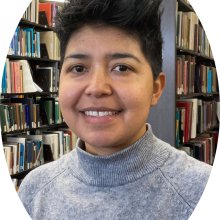
Ruth entered the Fellowship program in 2021 and is a student in the doctoral program within the Latin American, Caribbean and US Latino Studies department.
Ruth’s research interests involve Latinx, migration, health, and labor studies as well as qualitative methods that amplify community-based concerns and creativity.
Through the collection of oral histories, her dissertation explores the experiences of Central American undocumented domestic workers from the 1970s to the present.
Ruth centers the voices of women participating in this labor market to provide significant insights into remaining questions regarding Latin American immigrants’ community formation, informal household labor, and migrant health inequities in the US.
For over a year, she collaborated with CEMHD’s Amsterdam Health Task Force to raise awareness about COVID-19 vaccine misinformation among Spanish-speaking local migrant farm workers and translated a pamphlet from English to Spanish to raise awareness across the increasing language barrier in healthcare.
She also worked with Capital District Latinos on a community theater project to increase health promotion through community engagement.
In 2023, she worked with the Division of Community Outreach and Medical Education of Albany Medical Center to develop a qualitative service-learning assessment focused on the impacts of student service-learning experiences.

Radhika entered the Fellowship program in 2021 and is a doctoral student in the Department of Sociology.
Her current research examines how acculturation contributes to health outcomes among racially minoritized groups. She is also interested in substance use and mental health issues.
Radhika recently published a paper in the journal Health Behavior Research which examined adolescent marijuana use behaviors across the life course and within different demographic groups.
She has worked with the New York chapter of the American College of Physicians’ (NYACP) pain management task force, on drug policy and treatment, which is especially important given the rising trends in opioid overdose and deaths since the pandemic.
With this task force, Radhika worked on updating the opioid training course required for all New York doctors to include data on racial disparities in drug overdose specific to New York State.
Additionally, Radhika provided recommendations to NYACP’s Health and Public Policy Committee on legislation concerning opioid overdose prevention in NYS K-12 schools.
She drafted a legislative memo on behalf of NYACP, which included practical suggestions about how schools and families can work together in opioid overdose prevention and intervention.
Radhika’s goal is to translate her research into actionable steps by informing proposed policy and educational training among the health-care workforce.
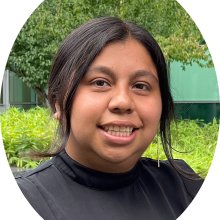
Esperanza joined the PhD program in the Biological Sciences Department and the Fellowship program in Fall 2021.
She has been active in organizations focused on supporting BIPOC students in STEM and established a chapter of the Society for the Advancement of Chicanos and Native Americans in Science.
Esperanza’s awareness of these disparities, academically and personally, has fueled her pursuit of a PhD in hopes of contributing meaningful findings that may lead to more effective treatments.
Her research interests include investigating the development and applications of stem cells and how molecular signaling changes can lead to systemic diseases. Currently, Esperanza’s research focuses on the process of protein synthesis process known as translation.
Earlier this year, she developed a new assay using a luciferase-encoding RNA. Last fall, Esperanza, with her advisor and collaborators, continued expanding this project by incorporating modifications in their luciferase-encoding RNA.
In the upcoming year, the team is preparing a manuscript with their findings for publication. They have also begun a secondary project assembling a fluorescent coding construct to determine the efficiency of sequences that may drive non-canonical translational.
One of her goals is to strengthen the communication between biomedical researchers and BIPOC communities.

Suzanne Sonpon, originally from Harlem, New York, graduated with a Bachelor of Science in Emergency Preparedness, Homeland Security, Cybersecurity, and Criminal Justice in 2020 from the University at Albany as a first-generation college student.
She furthered her education at UAlbany, obtaining a Master of Science in Digital Forensics & Cybersecurity in 2021. She is entering the Presidential Doctoral Fellowship Program in Health Disparities in Fall 2024 as a doctoral student in Information Science.
She possesses a diverse professional background, including roles in the drone, IT and pharmaceutical sectors. Suzanne’s primary goal is to address the challenges that technological advances pose to healthcare, particularly for vulnerable groups such as the elderly, homeless, and immigrants.
Her research aims to focus on these communities, advocating for those who lack the resources to obtain meaningful help.

Renae entered the PhD program in Biomedical Sciences at the College of Integrated Health Sciences and the Fellowship program in Fall 2021.
Her research focuses on understanding senescence as a related factor contributing to salivary gland dysfunction and develop/engineer exosomes with miRNAs to limit the severity of disease.
Kennedi’s goals are to define contributing factors to salivary gland dysfunction and understand health disparities aspect of head and neck cancer patients.
She is currently working on in vitro and mouse models to produce preliminary data of aging and senescence to receive more funding and for future presentations.
She gave a presentation at the RNA Institute Bioinformatics program about understanding the biological genes in African American women’s ancestry versus Caucasian women’s ancestry among cases of aggressive breast cancer and understanding the differences between the two groups of women.

Renae entered the PhD program in Biological Sciences at the College of Integrated Health Sciences and the Fellowship program in Fall 2021.
Renae is a rising black dentist-scientist who is passionate about increasing health opportunities for all.
Her work entails elucidating mechanisms that drive Sjogren's Disease — the second most prevalent autoimmune disease in the United States, which affects women more than men and American Indians more than African Americans and European Americans.
In this past year, Renae has focused on providing a forum for College of Integrated Health Sciences graduate students who identify as BILPOC to be mentored by their peers. They discussed topics like navigating their graduate career as a BILPOC and the importance of investing in your village for career development. Renae benefited as she sought to benefit others.

Dr. Cabrera-Tineo entered the Fellowship program in 2017 as a doctoral student in Counseling Psychology and successfully defended her dissertation in 2022.
She is now a counseling psychologist currently completing a trauma-focused psychology postdoctoral fellowship at Beacon Group Therapy in Boston, MA.
At the private clinic, she provides outpatient psychotherapy via telehealth for young adults presenting with mild to moderate psychopathology, substance use, physical health concerns and complex trauma histories.
Concurrently, Dr. Cabrera-Tineo is also an active researcher with several peer-reviewed publications and numerous presentations on issues regarding multiculturalism, mental health, health risk behaviors among emerging adults and marginalized populations, but not exclusively.
She plans to continue working as a scientist-practitioner to address issues around multiculturalism and health disparities.
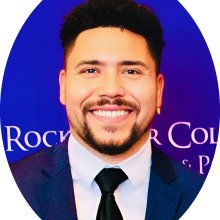
Dr. Escano entered the Fellowship in 2019 and received his doctoral degree from UAlbany’s School of Criminal Justice in 2024.
Dr. Escano’s general research interests include:
He is a quantitative researcher, thus far mainly using panel and time series models.
Dr. Escano aims to enter academia and become a leading criminologist (scholar) in crime and violence in Latin America and the Caribbean.
Dr. Escano has accepted a tenure track position as Assistant Professor in Department of Sociology and Criminology at Villanova University, beginning in Fall 2024.
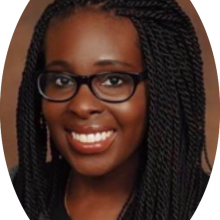
Dr. Kalu entered the Fellowship program in 2018 as a doctoral student in Sociology and received her degree in 2024.
Dr. Kalu’s research examines the sociology of stratification, the health consequences of social and demographic shifts relating to minority children and women, and utilizing critical frameworks as an asset-based approach to empower underserved populations.
Her focus deals with pressing issues like housing insecurity, limited healthcare access, and scarce educational resources. Her dissertation focused on gentrification and public education outcomes.
This work serves as a turning point, connecting her interest in social dynamics with the issues of social determinants of health, specifically education.
Dr. Kalu’s research examined a Southern U.S. community to assess the multi-level effects of individual school attributes, neighborhood socioeconomic changes, and overarching district demographics and policies to understand the impact of urban transformation on primary school educational outcomes.
Currently, Dr. Kalu is a Community Violence Prevention Postdoctoral Fellow at the Children's Hospital of Philadelphia; she is advancing research on hospital-based and community-focused programming for violence prevention.
Dr. Kalu has keen interest in methodological issues within social determinants of health research from a sociological lens.
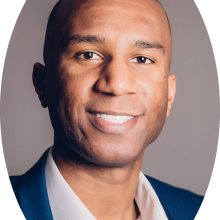
Dr. Lawrence entered the Fellowship program in 2016 as a doctoral student in the College of Integrated Health Sciences’s Department of Epidemiology and Biostatistics. He received his DrPH in 2020.
His research focuses on understanding how the social environment contributes to disparities in disease risk and mortality among structurally marginalized populations.
He seeks to understand the relationship between the neighborhood environment and health — specifically how residential area circumstances in which individuals are born, grow, live, work and age affect their health and quality of life.
Currently, Dr. Lawrence is investigating the contributions of racial residential segregation, psychosocial stressors and barriers to quality medical care to exacerbating cancer disparities and premature mortality.
His research also examines national trends in leading causes of death by race and ethnicity, and socioeconomic status.
Dr. Lawrence also serves as the Co-Chair of the Social and Structural Determinates of Health Working Group of the Connect for Cancer Prevention Study.
The Connect for Cancer Prevention Cohort Study is a new prospective cohort of 200,000 adults in the United States designed to further investigate the etiology of cancer and its outcomes.
In this role, he leads identifying measures to include in the study related to social inequalities and structural racism.

Dr. Myo entered the Fellowship program in 2017 as a doctoral student in the College of Integrated Health Sciences’s Department of Epidemiology and Biostatistics and successfully defended her DrPH dissertation in 2022.
Dr. Myo’s dedication to public health originates from her home country of Myanmar (Burma), particularly in addressing health equity and disparity.
She is now a Program Research Specialist at the New York State Department of Health’s Center for Community Health, where she focuses on women’s cancer research, specifically breast and cervical cancer.
In addition to research, Dr. Myo is deeply involved in community engagement and promoting the well-being of underserved diverse communities, especially the Burmese community in New York State’s Capital region.
As the Myanmar Multiethnic Sociocultural Association president, Dr. Myo collaborates with various agencies, such as the International Center of the Capital Region and the Northeast New York Coalition for Occupational Safety & Health.
Their collective efforts aim to promote occupational health and safety for underprivileged workers in the Burmese community.
Addressing health disparity issues in the Capital Region, she was acknowledged alongside other Asian American and Pacific Islander leaders by New York State Governor Hochul in 2023.
Dr. Myo’s unwavering commitment to meaningful contributions within and outside her research focus demonstrates a comprehensive dedication to societal well-being.

Dr. Noel entered the PhD program in the School of Criminal Justice and the Fellowship program in Fall 2016. In 2020, she received her PhD in Criminal Justice.
Currently, Dr. Noel is an Assistant Professor in the Department of Criminal Justice at Temple University.
Prior to her appointment at Temple University, she served as a graduate student researcher for the New York State Division of Criminal Justice Services, and as a postdoctoral fellow at American University in the Department of Justice, Law, and Criminology.
As a criminologist, Dr. Noel’s work focuses on the intersections of race, gender, transitions to adulthood and parental incarceration.
Utilizing qualitative research methods, her ongoing research examines parental incarceration among emerging adults and strength-based perspectives within incarcerated families.
Her mission is to reduce racial and health disparities among communities of color. She uses her educational platform to provide a voice for those who are marginalized.
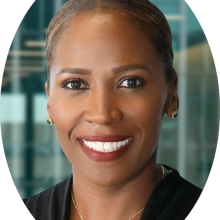
Dr. Reid entered the Fellowship program in 2016 as a doctoral student in the College of Integrated Health Sciences’s Department of Health Policy and Management and was awarded her DrPH degree in 2019.
Currently, she is Assistant Professor and Director of Public Health Programs at the University of St. Joseph (USJ). Prior to joining USJ, she was a visiting assistant professor at Mercy College in New York.
As a mixed-method health equity researcher, Dr. Reid’s research interests primarily focus on examining children's health outcomes and health disparities within the Black subpopulation, specifically the US Afro-Caribbean populations.
Additionally, she is deeply interested in exploring the role of ethnic identity in moderating health practices and outcomes.
As a public health practitioner, Dr. Reid supports youth-based organizations in Hartford, CT, by providing technical support in program development, grant writing and evaluation.
She is actively involved in a study exploring the perceptions, health-seeking behaviors and approaches to mental health care among Afro-Caribbean women in the United States.

Dr. Roberson-Miranda entered the doctoral program in Counseling Psychology and the Fellowship program in 2017 and received her degree in 2022.
Currently, she is an Assistant Professor at Fordham University in the Counseling Psychology graduate program.
She has provided mental health treatment to children and adults in various settings, including jails, outpatient clinics and hospitals.
She began engaging in research focused on racism and mental health disparities during her doctoral program and continued this work through her post-doctoral fellowship at the Institute for Health Equity Research at Mount Sinai Hospital.
Dr. Roberson-Miranda’s current research focuses on:
She received the NIH LRP grant — a program established by Congress and designed to recruit and retain highly qualified health professionals into biomedical or biobehavioral research careers — through which she is conducting an anti-stigma intervention with Black Americans in New York City.
Dr. Roberson-Miranda is on the editorial board for Psychiatric Quarterly and The Counseling Psychologist.

Dr. Seward entered the Fellowship program and the doctoral program in Health Policy Management and Behavior at the College of Integrated Health Sciences in 2018, receiving her DrPH degree in 2022.
She currently serves as Assistant Professor in Public Health and Preventive Medicine and Director of Community Engaged Learning at Upstate Medical University in Syracuse, NY.
Dr. Seward utilizes her roles within the university to advance health equity by training the next generation of health care providers.
Dr. Seward has focused on participatory action research to ensure that community health interventions and programs are based on the needs and/or assets of the community.
Through shared decision making, she ensures community members have a voice in the design and implementation of community-based research, interventions, and programs.
As a community health advocate, Dr. Seward has developed strategic approaches that center social justice and racial equity to decrease the disparities in Black maternal and child health.
Using community engagement as a vehicle for systemic change, she builds interdisciplinary, collaborative partnerships that are sensitive to diverse perspectives and population priorities.
Dr. Seward also has several professional affiliations where she donates her time, including serving as: